-
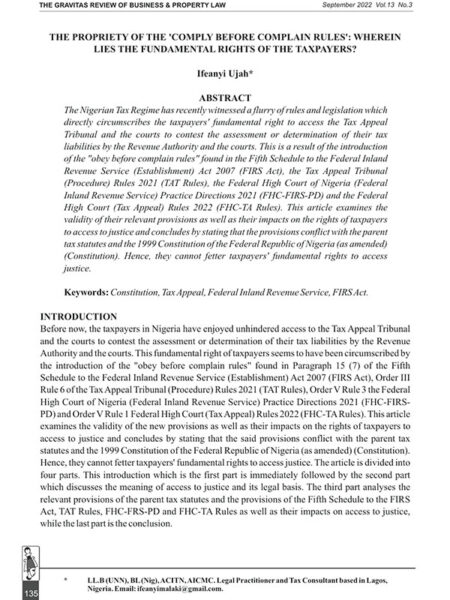
The Propriety of the ‘Comply Before Complain Rules’: Wherein Lies the Fundamental Rights of the Taxpayers?
0₦2,500.00Ifeanyi Ujah, a legal practitioner and tax consultant, in his article, The Propriety of the ‘Comply Before Complain Rules’: Wherein Lies the Fundamental Rights of the Taxpayers? observes that there has recently been a flurry of rules and legislation which directly circumscribes the taxpayers’ fundamental right to access the Tax Appeal Tribunal and the courts to contest the assessment or determination of their tax liabilities. This is a result of the introduction of the “obey before complain rules” found in the Fifth Schedule to the Federal Inland Revenue Service (Establishment) Act 2007 (FIRS Act), the Tax Appeal Tribunal (Procedure) Rules 2021 (TAT Rules), the Federal High Court of Nigeria (Federal Inland Revenue Service) Practice Directions 2021 (FHC-FIRS-PD) and the Federal High Court (Tax Appeal) Rules 2022 (FHC-TA Rules). Ujah examines the validity of these provisions as well as their impact on the rights of taxpayers to access justice.
-
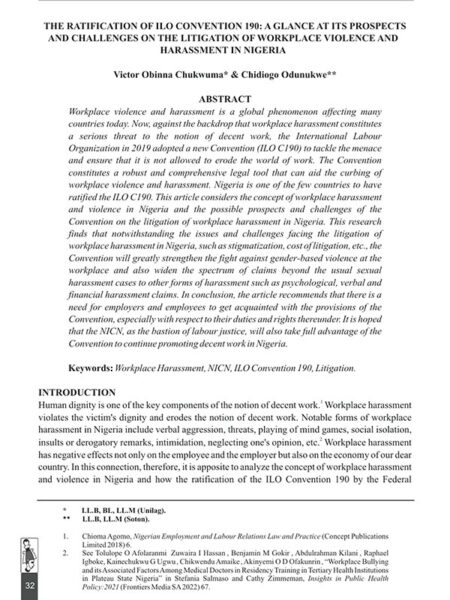
The Ratification of ILO Convention 190: A Glance at its Prospects and Challenges on the Litigation of Workplace Violence and Harassment in Nigeria
0₦2,500.00Victor Chukwuma and Chidiogo Odunukwe in their article, The Ratification of ILO Convention 190: A Glance at its Prospects and Challenges on the Litigation of Workplace Violence and Harassment in Nigeria, explore the ambit of workplace violence and harassment as a global phenomenon and the ILO’s adoption of a new Convention (ILO C190) in 2019 to specifically tackle the menace and to ensure that it is not allowed to erode the world of work. They consider the possible prospects and challenges of the Convention on the litigation of workplace harassment in Nigeria. They find that notwithstanding the issues and challenges facing the litigation of workplace harassment in Nigeria, the Convention will greatly strengthen the fight against gender-based violence at the workplace and also widen the spectrum of claims beyond the usual sexual harassment cases to other forms of harassment. They recommend that there is need for employers and employees to get acquainted with the provisions of the Convention especially with respect to their duties and rights thereunder.
-
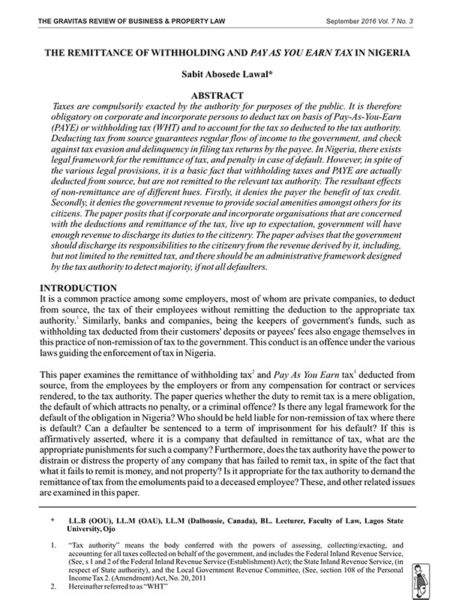
The Remittance of Withholding and Pay as You Earn Tax in Nigeria
0₦2,500.00Sabit Lawal, Lecturer, Faculty of Law, Lagos State University, Ojo, in her article “The Remittance of Withholding and Pay As You Earn Tax in Nigeria” undertakes a comprehensive review of the legal framework for remittance of WHT and PAYE tax in Nigeria. She examines issues of default and penalties for non-remittance with recommendations on how the tide of default may be stemmed.
-
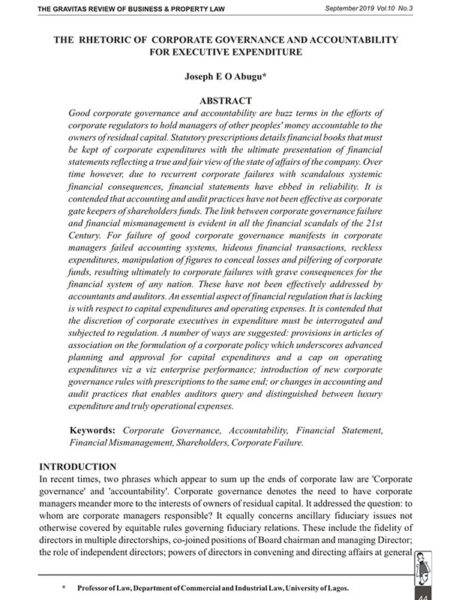
The Rhetoric of Corporate Governance and Accountability for Executive Expenditure
0₦2,500.00Joseph Abugu, Professor of Industrial and Commercial Law, University of Lagos in his article, The Rhetoric of Corporate Governance and Accountability for Executive Expenditure, argues that though financial statements of companies should reflect a true and fair view of their state of affairs, recurrent corporate failures have affected the credibility of financial statements. He posits that hideous financial transactions by corporate executives, reckless expenditures and manipulation of figures to conceal losses and pilfering are the failure of good corporate governance. He suggests ways by which the discretion of corporate executives in expenditures can be interrogated and subjected to regulation.
-
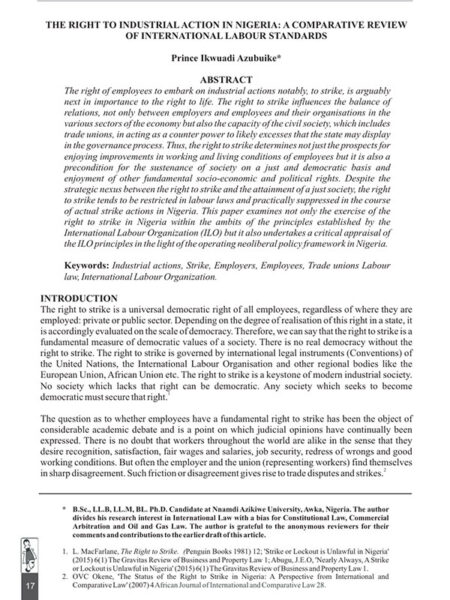
The Right to Industrial Action in Nigeria: A Comparative Review of International Labour Standards
0₦2,500.00Prince Azubuike, legal practitioner and researcher in his article, The Right to Industrial Action in Nigeria: A Comparative Review of International Labour Standards, notes that the right of employees to strike determines not just their prospects for enjoying improvements in working and living conditions, but it is also a precondition for the sustenance of a just and democratic. Despite the strategic nexus between the right to strike and the attainment of a just society, the right to strike tends to be restricted in labour laws and practically suppressed in the course of actual strike actions in Nigeria. He examines the exercise of the right to strike in Nigeria and other jurisdictions within the ambits of the principles established by the International Labour Organization (ILO).
-
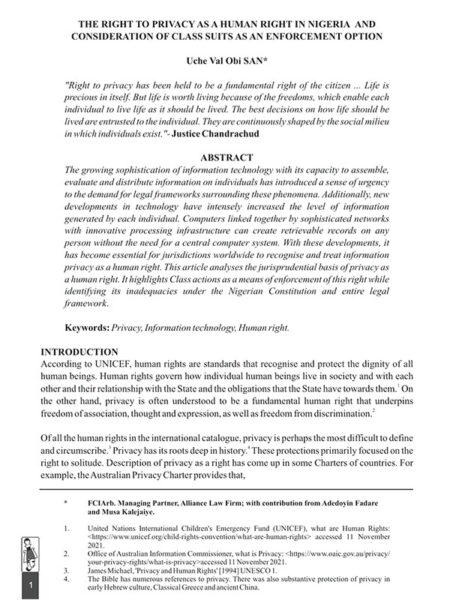
The Right to Privacy as a Human Right in Nigeria and Consideration of Class Suits as an Enforcement Option
0₦2,500.00Uche Val Obi SAN, Managing Partner, Alliance Law Firm, in his article, The Right to Privacy as a Human Right in Nigeria and Consideration of Class Suits as an Enforcement Option, notes that the growing sophistication of information technology with its capacity to assemble, evaluate and distribute information on individuals has introduced a sense of urgency to the demand for legal frameworks surrounding these phenomena. He argues that it has then become essential for jurisdictions worldwide to recognise and treat information privacy as a human right. Val Obi, SAN analyses the jurisprudential basis of privacy as a human right, constitutional and extant legislation on protecting and redressing privacy rights infringement in Nigeria. He highlights Class Action as a means of enforcement of privacy rights while identifying its inadequacies under the Nigerian Constitution and the entire legal framework.
-
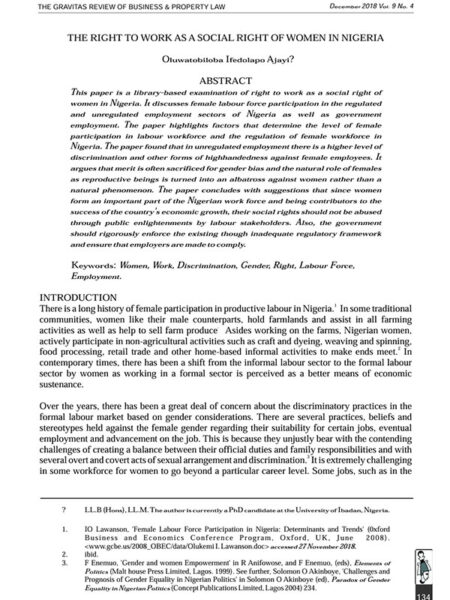
The Right to Work as a Social Right of Women in Nigeria
0₦2,500.00Oluwatobiloba Ajayi, Candidate at the University of Ibadan in her paper, The Right to Work as a Social Right of Women in Nigeria, discusses female labour force participation in the regulated and unregulated employment sectors in Nigeria. She highlights factors inhibiting advancement of women in the labour market and how laws regulating women employment in Nigeria have been inadequate. She considers employment of women in public, regulated private, and unregulated private sectors of the labour force, and concludes with recommendations on how the legal regime on employment of women could be strengthened to enhance the welfare of women employees.
-
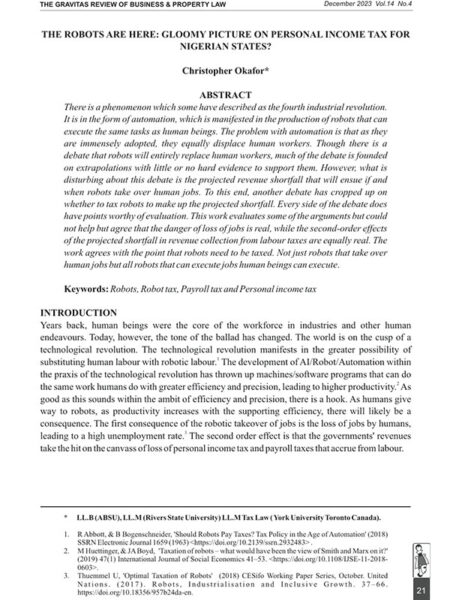
The Robots Are Here: Gloomy Picture on Personal Income Tax for Nigerian States?
0₦2,500.00Christopher Okafor Esq, in this article, The Robots Are Here: Gloomy Picture on Personal Income Tax for Nigerian States, examines the emergence of robots in the workplace with its potentiality for job losses and a reduction in taxable revenue. The emerging phenomenon which some have described as the fourth industrial revolution is in the form of automation which is manifested in the production of robots that can execute the same tasks as human beings. The problem with the automation is that as they are immensely adopted, they equally displace human workers. Though there is a debate that robots will fully replace human workers, much of the debate is founded on extrapolations with little or no hard evidence to support. However, what is disturbing about this debate is the projected revenue shortfall that will ensue if and when robots take over human jobs. To this end, another debate has cropped up on whether to tax robots to make up the projected shortfall. Every side of the debate does have points worthy of evaluation. Okafor evaluates some of the arguments but could not help but agree that the danger of loss of jobs is real, while the second order effects of projected shortfall in revenue collection from labour taxes is equally real. Okafor agrees with the point that robots need to be taxed. Not just robots that take over human jobs but all robots that can execute jobs human beings can execute.
-
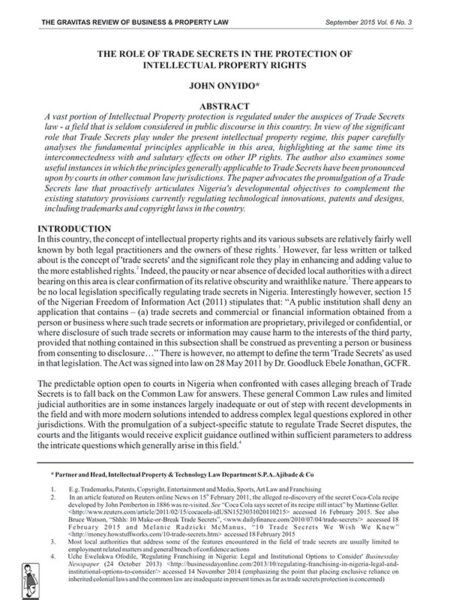
The Role of Trade Secrets in the Protection of Intellectual Property Rights
0₦2,500.00John Onyido, Partner, SPA Ajibade & Co, in his article “The Role of Trade Secrets in the Protection of Intellectual Property Rights” explores the seldom walked path of Trade Secrets in the protection of intellectual property. He bemoans the absence of a Trade Secrets law in Nigeria despite the fact that, in the word of Karl Jorda, “…trade secrets cover over 90% of all new technology; and over 80% of all license and technology transfer agreements cover trade secrets or constitute hybrid agreements relating to patents and trade secrets”.
-
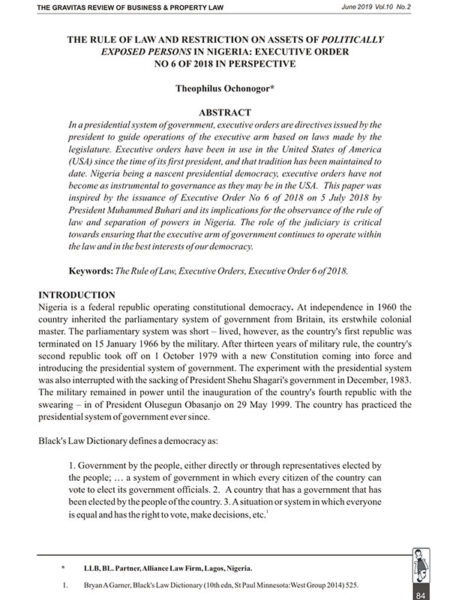
The Rule of Law and Restriction on Assets of Politically Exposed Persons in Nigeria: Executive Order No.6 of 2018 in Perspective
0₦2,500.00Theophilus Ochonogor, Partner, Alliance Law Firm, Lagos Nigeria in The Rule of Law and Restriction on Assets of Politically Exposed Persons in Nigeria: Executive Order No. 6 of 2018 in Perspective, reviews the constitutionality of Executive Orders (EO) generally, and EO6 specifically. Theophilus explores the jurisprudential history of Executive Orders, relevant cases on the issue, and argues that EO6 which empowers the Attorney General to preserve and protect from dissipation the assets of current or former government officials, or any politically exposed person is arbitrary, an usurpation of judicial powers, and an assault on the country’s constitutional democracy.
-
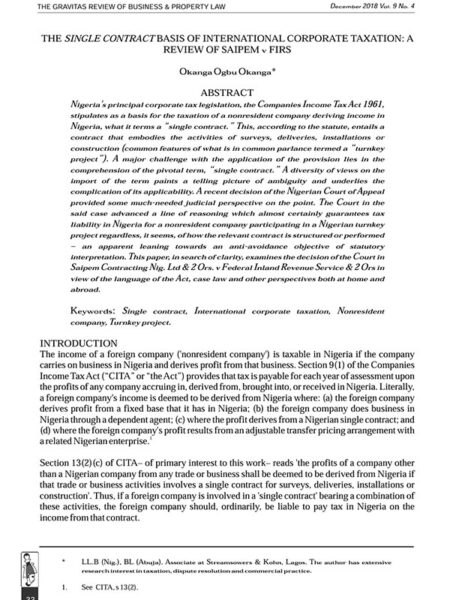
The Single Contract Basis of International Corporate Taxation: A Review of Saipem v FIRS
0₦2,500.00Okanga Okanga, Associate at Streamsowers & Kohn in his article, The Single Contract Basis of International Corporate Taxation: A Review of Saipem v FIRS, examines the tax liability of nonresident companies in single contracts, otherwise known as turnkey projects. He reviews the Court of Appeal’s decision in Saipem v FIRS to the effect that where a turnkey contract is executed by multi-jurisdictional members of a consortium, in so far as the obligations of the individual members are related components of the same project, the entire contract will be taxable in Nigeria irrespective of where the obligations of each member of the consortium were discharged. Okanga advocates a more distilling approach, like in India, such that the substantive intent of the consortium participants, rather than description, will determine liability to tax.
-
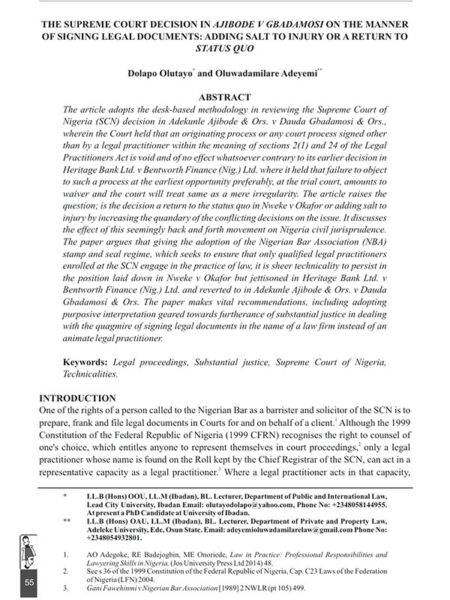
The Supreme Court Decision in Ajibode v Gbadamosi on the Manner of Signing Legal Documents: Adding Salt to Injury or a Return to Status Quo
0₦2,500.00Dolapo Olutayo of the Lead City University and Oluwadamilare Adeyemi of Adeleke University, in their article, The Supreme Court Decision in Ajibode v Gbadamosi on the Manner of Signing Legal Documents: Adding Salt to Injury or a Return to Status Quo, review the decision of the Supreme Court that an originating process or any court process signed other than by a legal practitioner is void and of no effect. The decision in Ajibode is contrary to the Supreme Court’s earlier decision in Heritage Bank v Bentworth where it held that failure to object to such a process at the earliest opportunity amounts to waiver, and the court will treat same as a mere irregularity. Olutayo and Adeyemi raise the question: is Ajibode a return to the status quo of Nweke v Okafor or only adds to the quandary of conflicting decisions on the issue?
The Gravitas Review of Business & Property Law



